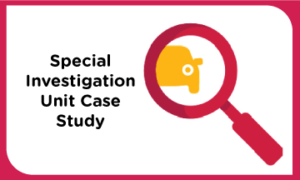According to the National Association of Insurance Commissioners (NAIC), auto theft fraud costs insurance carriers and consumers $308.6 billion annually. Maryland Auto is committed to preventing fraudulent claims, which the FBI says can cost the average family between $400 and $700 per year in additional premiums. Maryland Auto takes insurance fraud seriously and has implemented measures to ensure that payments are made only on legitimate claims. When fraud is suspected, claims are sent to our Special Investigations Unit (SIU) for further examination.
Maryland Auto recently investigated a claim in which another vehicle struck the Maryland Auto-insured vehicle while completing a U-turn. A friend of the policyholder was driving the insured vehicle at the time of the crash and was running errands with two passengers, a female sitting in the front seat and a male lying down in the back seat. When the claim was filed, the passengers did not claim any injuries. The occupants of the vehicle said that the Baltimore City Police responded to the crash scene, but no report was written, and there were no witnesses to the incident.
The male passenger later presented a Personal Injury Protection (PIP) claim for injuries to his neck and right shoulder. He stated that he attempted to go to a walk-in clinic for treatment, but the clinic refused to see him without an accident referral number.
The claim for the vehicle damages totaled over $5,000. Maryland Auto inspected the insured vehicle’s damages, and a draft was issued, payable to the policyholder and selected body shop to begin the repairs. A bank draft guarantees the funds to the person receiving it by taking the money issued on the draft out of the bank account ahead of time. Insurance companies typically pay with drafts. To prevent fraudulent activity, the draft is issued to, and must be signed by, both the vehicle owner and repair shop for the funds to be accessed.
At this point, the validity of the claim began to unravel. Maryland Auto’s claims representative could not verify the legitimacy of the body shop where the insured vehicle was set to be repaired. The policyholder’s son alleged that he owned this body shop and would complete the repairs to the insured vehicle. Maryland Auto sent a Field Representative to review the body shop location. They observed an old van, a riding lawnmower, a bumper, and some lumber visible, along with the unrepaired, inoperable insured vehicle. The representative noted that the location did not appear to a legitimate business operation.
Further discussion with the driver of the insured vehicle also revealed that the injured male passenger was not actually in the vehicle at the time of the crash. In industry terms, this type of fraud is referred to as a “jump in.” A person who was not involved in an accident either comes to the scene and literally jumps in the crashed vehicle, or falsely claims to have been in the vehicle, and reports injuries in order to collect lost wages and possible other compensation.
Due to the suspicious claim indicators with the body shop and the passenger, the claim was referred to Maryland Auto’s SIU for further investigation. The SIU investigator requested that all three reported occupants of the insured vehicle and the policyholder’s son, who was not involved in the crash, but claimed to own the body shop, complete an Examination Under Oath (EUO).
Only the policyholder’s son agreed to participate in the EUO, during which he provided only vague testimony. He explained that the insured driver was a neighborhood friend. He said that he knew the male passenger but did not know the female passenger. The only information he had about the accident was what the driver told him.
The policyholder’s son then testified that the body shop owners were friends of a family member. He claimed that he has worked on his own vehicles and worked for various body shops but did not provide proof of employment after it was requested by the investigator. Additionally, he said that his mother (the policyholder) signed the draft, and he signed on behalf of the body shop. He testified that he had ordered parts to complete repairs to the insured vehicle but no longer had the receipts for those parts. He later indicated that the funds from the draft might have been used for other things, such as rent and food, instead of the repairs and vehicle parts.
The claim was denied due to discrepancies in the number of passengers in the insured vehicle at the time of the accident, the lack of cooperation by the claimants to appear for an EUO, and the admitted forgery of the initial insurance draft for repairs. The claim was forwarded to Maryland’s Insurance Fraud Division for further review.




